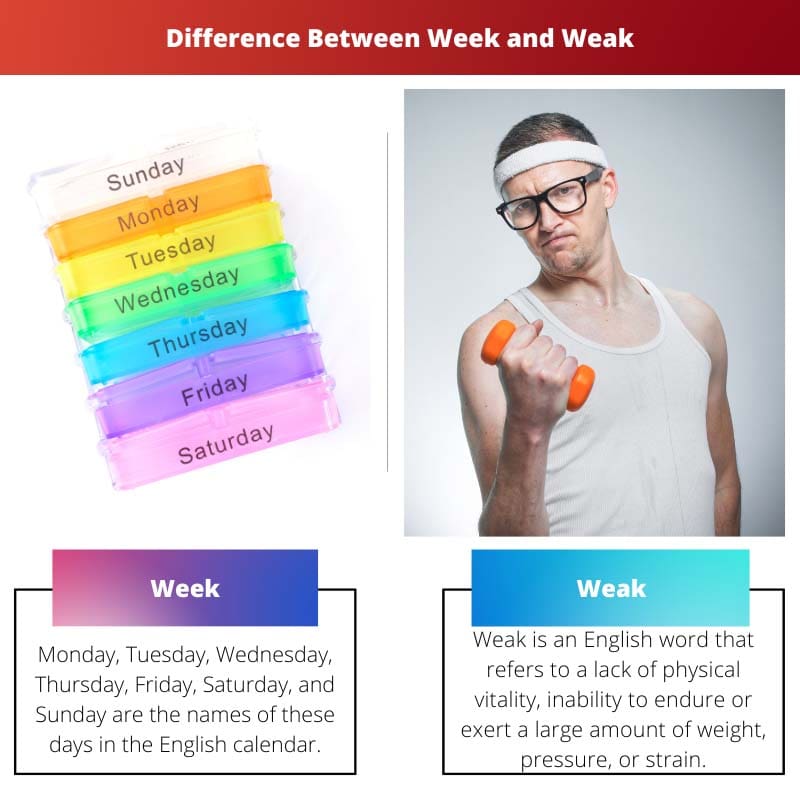There is a lot of confusion between the terms week and weak English grammar usage. The scepticism is due to the phonetic resemblance between these two terms.
Weak and week are homonyms, meaning they have similar sounds but different meanings. Let us see what they mean and their usage.
Key Takeaways
- “Week” refers to a period of seven days, commonly used to measure time, while “weak” describes a lack of strength, power, or vigor.
- “Week” is used in various scheduling, planning, and time management contexts, whereas “weak” can describe physical, emotional, or intellectual deficiencies or vulnerabilities.
- The two words are homophones, meaning they sound similar but have different meanings and uses; “week” is a unit of time, while “weak” is a descriptor for a state or condition.
Week vs Weak
Seven days are collectively called a week, including Monday, Tuesday, Wednesday, Thursday, Friday, Saturday, and Sunday. From Monday to Friday, they are called weekdays, and Saturday and Sunday are considered weekends. Weak refers to the physical ability or potential of anything, focusing on strength.

A week is seven days. In most of the world, it is the conventional period for rest day cycles, mostly alongside—but not strictly part of—the Gregorian calendar.
Monday, Tuesday, Wednesday, Thursday, Friday, Saturday, and Sunday are the names of these days in the English calendar, with Monday being the first. One could also call a week such as this a planetary week.
Weak is an English word that refers to a lack of physical vitality, inability to endure or exert a large amount of weight, pressure, or strain, or failure to resist external force or survive an attack. Its usage is as an adjective in a sentence.
Weakly is the adverb form of weak.
Comparison Table
| Parameters of Comparison | Week | Weak |
|---|---|---|
| Introduction | It denotes the seven days of the Gregorian calendar. | It is an English word and implication in terms of strength. |
| Origin | The concept of the seven-day week was used in 321 CE by emperor Constantine. | First, known use was in the 13th century. |
| Significance | It signifies Sunday, Monday, Tuesday, Wednesday, Thursday, Friday, Saturday together. | It signifies inferiority to something or someone. |
| Etymology | Suppose to have evolved from ‘weke’ (middle English) and wice (old English). | Known to have been evolved from ‘weike’ (middle English) and ‘wican’ (old English) |
| Function word | Its usage is as a noun. | Its usage is an adjective. |
What is Week?
Except for daylight saving time transitions or leap seconds, our concept of a week is seven days. One week counts to 7 days; 7 days counts to 168 hours; 68 hours counts to 10,080 minutes;10,080 minutes counts to 604,800 seconds.
Several languages name the days of the week after classical planets or pantheon gods.
People frequently use the term “week” to refer to other time units which have many days, such as the ancient Roman calendar’s nundinal cycle or the ‘work week’ or ‘school week,’ which refers primarily to the days spent on those activities.
“Week” comes from the Old English word ‘wice’, and means “to turn, or change.” The classical planets were given names for the days of the week. The names of the weekdays are not in the traditional sequence of the planetary order.
Rather than assigning names to subsequent days based on conventional order, planetary hours gave days to planets three places apart.
The Pacasiddhntik dates from the 6th century and mentions the seven-day week in India. Shashi (2000) cites the Garga Samhita as a probable older reference to a seven-day week in India, dating from the 1st century BC or AD.

What is Weak?
Weak is an English vocabulary word for indicating physical weakness. But it is not limited to physical strength and can have diverse meanings.
The comparative and superlative degree of weak is weaker and weakest, respectively. The word ‘weak’ as an adjective can have different meanings, such as:
Lacking in force or ability;
For example, The labour was too weak to move the rock.
Unable to withstand a significant amount of weight, pressure, or tension;
For instance, Do you want a weak rope or a strong one?
Easily impressed, affected, or overcome; accessible; vulnerable; unable to resist temptation, urgency, persuasion;
For example, Your weak resolutions are not going to take you
anywhere.
Dilute, without flavour or potency;
For example, The refugee camp served weak tea and poor food.
That does not entirely ionise into anions and cations;
For example, Formic acid is a weak acid.
There is a lack of enthusiasm and expression;
For example, That particular actor has a weak style.
Synonyms of ‘weak’ are tender, asthenic, wasted, delicate, enfeebled, feeble, low, faint, slight, unsubstantial, and many more.
Antonyms of ‘weak’ are strong, mighty, powerful, rugged, stalwart, stout.
Phrases Containing weak are
a weak force; weak-kneed; weak link; weak moment; weak sauce; weak-minded; a weak side, and weak anthropic principle.

Main Differences Between Week and Weak
- The appellation week refers to seven days. Weak is something that lacks physical strength, is fragile, and is not strong.
- Emperor Constantine introduced the concept of a seven-day week in 321 CE. A similar word, weak, came into origin in the 13th century.
- Sunday, Monday, Tuesday, Wednesday, Thursday, Friday, and Saturday make up a week. Weakness refers to being inadequate for something or someone.
- The word ‘week’ comes from the Middle English words ‘weke’ and ‘wice’ (old English). Some scholars say weak originates from the Middle English words weike and wican (old English).
- This language uses the word ‘week’ as a noun. The ‘weak’ use of the word is an adjective.

- https://www.taylorfrancis.com/books/mono/10.4324/9780429482359/long-week-end-1897-1919-wilfred-bion-francesca-bion
- https://www.degruyter.com/document/doi/10.1515/9781400828159/html?lang=en
